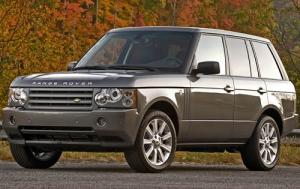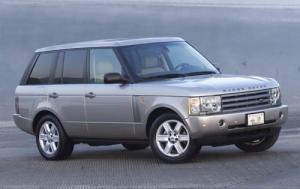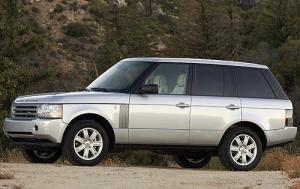In today's extremely overpriced used car market, many shoppers are now looking for "older" models that have aged well as a way to save significant dollars.

Range Rovers, although expensive, are popular for a reason. They are well-built, luxurious, and rugged. Land Rover is known for its high-quality materials and top-notch amenities and accessories across all models.
But reliability and dependability become all the more crucial when considering an older vehicle. And while Range Rovers, in general, have been known for their luxurious features, off-road capabilities, and stylish design, they have also faced criticism for certain reliability issues that some owners have experienced.
So here, ...
- We'll do an overview of an older Range Rover generation that is now more affordable, specifically the third which was produced from 2003 - 2012.
- Then we'll list possible mechanical issues that have been reported by owners so they can be checked before buying one today.
- And then we'll summarize the overall pros and cons of an older Range Rover worth consideration by potential buyers.
Third Generation Range Rover (2003- 2012)
Land Rover has become known for producing luxury SUVs with outstanding off-road capabilities. In fact, the Range Rover is one of the most capable off-road vehicles at any price.
The 3rd generation Range Rover was actually engineered during the brief time that BMW owned Land Rover. The result is unibody construction and a fully independent suspension which accounts for its soft, luxurious drive on pavement while still maintaining its rough and ready driving ability.

Up until 2005, the engine was also sourced from BMW: a 4.4-liter V8 with 282 horsepower. In 2006, its new parent, Ford, replaced the engine with one sourced from Jaguar on what became the HSE model, a 4.4-liter with 305 horsepower ... still not too shabby. The Supercharged model has a 4.2-liter engine good for 400 ponies.
The interior is a mix of the old and the new. Range Rover has a long tradition and they didn't want to sacrifice that total look. But with its leather seats, walnut inlay and navigation system (with off-road mapping as well), there's no mistaking it for anything other than a luxury vehicle.
The 2006 model added a backup camera and adaptive headlights as standard equipment. Additionally, the 2007 model was upgraded further with a customizable 4-wheel drive system, an upgraded rear differential and an electronic parking brake. The interior was also mildly refreshed in 2007 with a more user-friendly control layout, new cupholders and twin gloveboxes.
After the fairly significant update in 2007, the 2008 Range Rover stood mostly pat except for some minor interior detail changes. In 2009, the dashboard received softer leather and new wheel designs, and road noise was reduced thanks to new door seals.
Also debuting was a new Autobiography package that includes special leather and wood trim plus some additional standard features.

2010 saw some minor exterior revisions along with the addition of a new navigation system and LCD instrument cluster, a 360-degree parking assist camera and adaptive cruise control. There were also some updating tweaks to the adaptive suspension as well as the stability control and Terrain Response systems.
The 2011 Land Rover Range Rover saw improvements to the ascent and descent control features as well as new optional reclining rear seats and a 19-speaker premium audio system, while the 2012 version just received some minor feature reshuffling as well as black accents around the grille, headlights and taillights.
2003 - 2012 Range Rover Possible Mechanical Problems
This third generation Range Rover has been reported to have various mechanical issues by some owners. It's important to note that experiences can vary, and not all vehicles encountered these problems. However, these issues should be included in an inspection before buying one today.
Air Suspension Problems: Range Rovers are equipped with air suspension systems, and issues such as air leaks, compressor failures, or sensor malfunctions can lead to problems with ride height and comfort.
Electrical Issues: Some owners have reported problems with the vehicle's electronic systems, including issues with the infotainment system, air conditioning, and other interior features.
Transmission Problems: Instances of transmission failures or issues with shifting have been reported.
Cooling System Concerns: Overheating problems and issues with the cooling system have been reported, potentially leading to engine damage if not addressed promptly.
You May Also Like:
Do This For The Best Trade-In Price
How To Get The Lowest Rate Car Loan
Oil Leaks: Owners have reported oil leaks, which can be attributed to various factors such as gasket failures or oil seal issues.
Brake System Problems: Some owners have experienced issues with the braking system, including brake wear and potential brake fluid leaks.
Engine Performance: There have been reports of engine-related problems, including misfires, rough idling, or reduced performance.
Suspension Bushing Wear: Over time, suspension bushings may wear out, leading to noise, vibrations, or changes in handling.
Overall Older Range Rover Pros And Cons
Range Rover Pros
Cost Savings: Obviously, older models tend to be significantly cheaper than newer ones, saving a substantial amount of money upfront.
Luxurious Interior: Range Rovers are known for their opulent and well-crafted interiors with high-quality materials.
Off-Road Capability: The third-generation Range Rover maintains excellent off-road capabilities, making it suitable for various terrains.
Advanced Technology: Newer models come equipped with advanced technology features, including infotainment systems, driver assistance, and safety features.
Powerful Engine Options: Range Rovers offer a range of powerful engine options, providing a combination of performance and versatility.
Comfortable Ride: The vehicle typically provides a smooth and comfortable ride, making it suitable for long drives.
Generous Cargo Capacity: Range Rovers typically offer ample cargo space, making them suitable for hauling luggage and other items.
Versatility: Foldable rear seats and adjustable cargo configurations enhance the versatility of the cargo space.
Range Rover Cons
Reliability Concerns: Some owners have reported reliability issues including electronic and mechanical problems.
High Maintenance Costs: Range Rovers are known for having higher maintenance and repair costs compared to some other luxury SUVs, potentially offsetting some or all of the upfront cost savings.
Fuel Economy: Due to their powerful engines and weight, Range Rovers tend to have lower fuel efficiency compared to smaller, more fuel-efficient vehicles.
Depreciation: Range Rovers often experience significant depreciation over time, leading to a lower resale value.
Limited Third-Row Space: In models with third-row seating, the available cargo space is reduced when the third row is in use.
High Load Floor: The high load floor may make it slightly more challenging to load heavy or bulky items.
Premium Fuel Requirement: Some models require premium fuel, adding to the overall cost of ownership.
 By Josh Rosenberg
By Josh Rosenberg